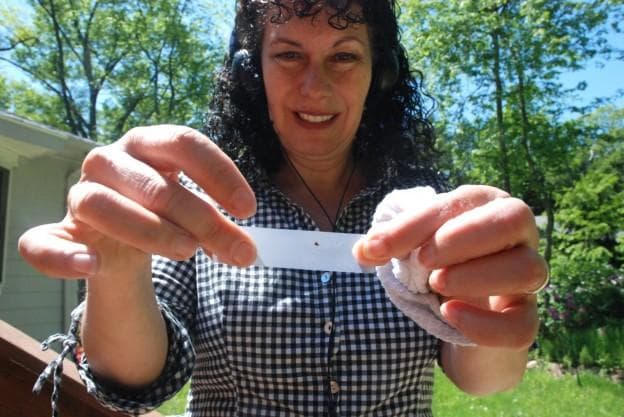Advertisement
In Lincoln, It's Town Vs. Ticks
ResumePart 1 of a special series
LINCOLN, Mass. — Lincoln is a picture-postcard New England town, with old stone walls along winding, wooded lanes. It’s one of the richest towns in the U.S., with median annual household incomes topping $100,000. But Lincoln’s wealth has provided no immunity to a disease that is spreading dramatically across Massachusetts: Lyme disease.

Barbara Buchan is a longtime resident of Lincoln. She's kindly agreed to give me a tour of her one-acre yard and garden -- but first she insists that I dress appropriately.
“Before I head into my garden I make sure I’m geared for the job,” Buchan says. “That means if I’m wearing pants, I wear socks outside the pants leg. I have footwear that’s all been sprayed with permethrin.”
That's an insecticide. Buchan is worried about deer ticks, which carry Lyme disease and are pervasive in Lincoln. Once I'm properly outfitted, we head into the backyard to see her tick-fighting tactics.

“I have string on which to hang strong-smelling soap, which keeps the deer away," Buchan says. "There will be a mulch edging to all the grass, which will be cut regularly — ticks don't like dry mulch." She adds, “I'm beginning to figure out how to use my mint — ticks loathe mint.”
I felt a little silly wearing borrowed beige stretch pants tucked into white socks, and we were only in her backyard for about 15 minutes. But before going back inside to change, I did a quick self-inspection, and there on my beige knee was some kind of tiny, slowly creeping tick. I was aghast, but my host wasn’t too surprised.

"You see, you took chances," Buchan said. "You were going in areas where there was tall grass and all that stuff."
Lincoln Fights Back
Buchan isn't just concerned about her own property. She's a member of the town of Lincoln's Tick Task Force, which was formed by town officials and residents after the town won a grant in 2009 to tackle whatever health concerns the townspeople considered most pressing.
To find out what those concerns were, Assistant Town Administrator Anita Schiepers says the town conducted extensive surveys. Responses came from every corner: parents and seniors, the horse set and the gardeners, the dog-owners and the trail-hikers.
“Every response said that the individual either had Lyme disease, a member of their family had Lyme disease, or they knew of a neighbor who had Lyme disease,” Schiepers says.
Lincoln's Tick Task Force focused first on educating citizens about how to recognize Lyme disease, and how to protect themselves through simple measures, like using insect repellent and checking for ticks. The town sent schoolchildren home with flyers, and left binders full of information in doctors’ waiting rooms.
The work of the Tick Task Force has been “a passionate effort both by townspeople and by staff,” Schiepers says.
Lyme 101
Lyme disease is caused by bacteria that are carried by deer ticks. These blood-sucking arachnids have a complex life cycle. The adults feed and mate primarily on deer. Their offspring feed on small mammals, mostly mice, which host the Lyme bacteria and share it among the immature ticks, called nymphs. Deer tick nymphs are the main culprits in transmitting the disease to humans.
“The nymph stage of this tick is voracious,” says Dr. Arnold Weinberg. “It’s tiny, and lots of people don’t appreciate that that beauty mark that’s on their arm, my gosh, it’s moving!”

Weinberg, an infectious disease specialist for over 50 years, also serves on Lincoln’s Board of Health. He sees Lincoln as a robust environment for Lyme disease. “All the ingredients are there: deer, mice, ticks, and people that love the meadows and the woods and the trails.”
Weinberg says that if people find an engorged deer tick or develop the telltale "bull's-eye" rash, and seek treatment promptly, they can generally be cured with antibiotics. But if Lyme disease is not treated early, it can lead to arthritis, meningitis, extreme fatigue and nerve damage, among other symptoms.
Of Mice And Men
“Part of the problem is that there is no clear, single solution to the problem,” Schiepers says. She points to one device aimed at preventing the spread of Lyme disease: the “tick tube,” a small cardboard tube filled with cotton soaked with permethrin. It’s meant to work like this: The tubes are scattered in the underbrush. Mice take the treated cotton to their nests, where it kills the ticks that feed on the mice, which host the Lyme disease bacteria.
Schiepers says the town of Lincoln has been buying “tick tubes” by the thousands, and selling them to residents at cost. It’s as yet unclear how well this method is working in Lincoln, but, she says, “My phone has been ringing off the hook in terms of people trying to find that product so they can use it in their yards.”
Deer Town
Townspeople are also fighting Lyme disease in their own ways. Lincoln’s woods are full of deer, and some property owners hire bow-hunters to kill them.
“We thought it would be easy to have a hunter come," says Robin Wilkerson. “And there’s a guy who’s killed two deer on the street. And we’re happy about it, and the venison is delicious!”

Wilkerson is a Lincoln resident who gardens organically; she doesn’t want to use tick tubes. But she admits that killing deer in one part of town won't stop them moving in from another. The ticks are everywhere. “It’s not like there's an enemy that you can just mow down,” she says. “It's like they're permeated into the ecology of the town."
Know Your Tick
As for that unidentified tick that crawled up my leg after 15 minutes in Barbara Buchan's backyard, we sealed it in Scotch tape. Later that day, we took it to Arnold Weinberg, the infectious disease doctor.
Weinberg sizes it up quickly. “OK,” he says. “This is an adult ixodes scapularis tick.” In other words, a deer tick.
Weinberg tells me, “I think the fact that an adult ixodes scapularis tick was on you in a very, very short time tells you that the ticks are prevalent in this community, as in many other communities.”
Despite that, Weinberg says preventing Lyme disease is fairly simple: “What it basically boils down to is that if you don’t want to get Lyme disease, all you have to do is protect yourself.”
Anita Schiepers disagrees. "It is not just a case of educating the public to protect themselves," she says. "Wearing long pants, white socks and checking yourself after each trail walk is not totally the answer."
In Lincoln, Schiepers says, it just hasn't been enough.
“We have a very educated public in town. They care very much in terms of protecting themselves, protecting their families, and they have the resources to do it. And despite all that we still have a very high incidence of Lyme disease in our community.”
This program aired on June 25, 2012.